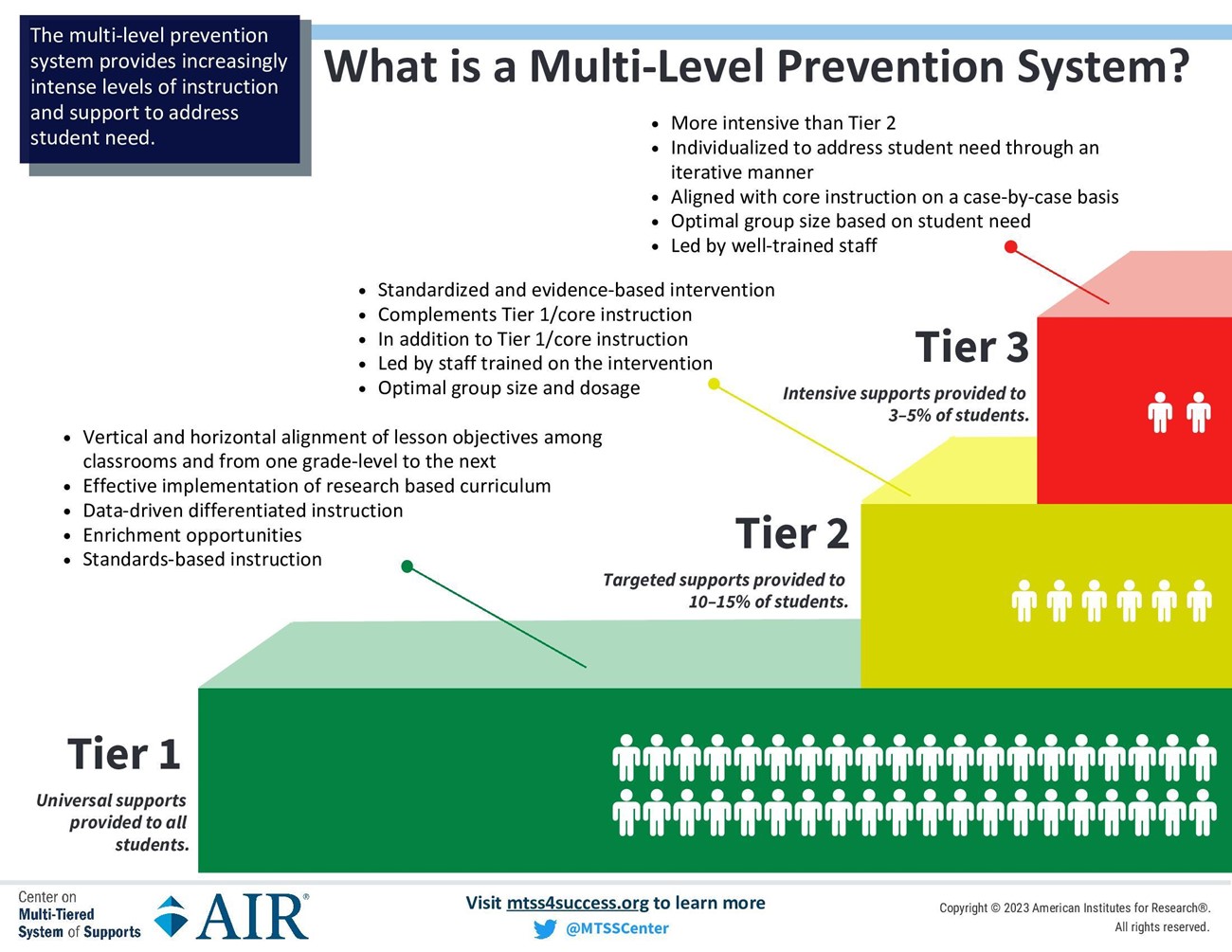MULTI-TIERED SYSTEM OF SUPPORTS
What is Multi-Tiered System of Supports (MTSS)?
Pennsylvania’s Integrated Multi-Tiered System of Supports (MTSS) is designed to enhance the academic, behavioral, and social-emotional outcomes for all students through a comprehensive framework. It emphasizes equitable access to high-quality, standards-aligned instruction and tailored interventions, for all students.
What are the key components of the MTSS Framework?
- Responsiveness to Intervention (RTI): This methodology helps determine students’ growth rates and performance levels as an alternative to traditional ability-achievement discrepancy models for identifying Specific Learning Disabilities (SLD).
- Collaborative Teams: Interdisciplinary teams across various school levels use a data-informed, problem-solving approach to implement evidence-based practices that meet individual student needs.
- Universal Screenings: Tools like STAR Reading (K-8) and STAR Math k-5 (K, 5) along with LinkIt! Math 6-8, and students taking Algebra and Biology Keystones, provide performance data to identify students who may require additional support.
- Research-Based Interventions: These are effective teaching methods or programs used to support students struggling in specific areas, ensuring they receive the necessary interventions beyond Tier I instruction.
- Progress Monitoring: Ongoing assessment, both formal and informal, tracks student progress and the effectiveness of interventions, allowing for adjustments as needed. If a student is not responding to an intervention, alternative strategies can be employed, and further support can be considered if necessary.
Overall, Pennsylvania’s MTSS framework promotes a systematic approach to enhancing student outcomes through targeted interventions and collaborative practices.
What does the MTSS Framework look like?
The MTSS Framework is structured into three tiers, each providing varying levels of support based on student needs:
Tier I Supports
- Universal Instruction: All students receive high-quality, research-based general education instruction.
- Ongoing Assessment: Continuous universal screening and assessment inform instructional practices to meet the diverse needs of all learners.
Tier II Supports
- Targeted Interventions: For students who are not making adequate progress with Tier I instruction alone, small group interventions are introduced.
- Progress Monitoring: Students receiving Tier II support are closely monitored using tools designed to track specific skill improvements.
Tier III Supports
- Intensive Interventions: This tier provides more intensive, individualized support for students who have not made significant progress in Tier II support, are more than 1.5 grade levels behind, or are below the 10th percentile.
- Enhanced Progress Monitoring: Students receiving Tier III support are monitored with sensitive tools to evaluate their progress effectively.
This structured approach ensures that all students receive the appropriate level of support tailored to their needs, promoting their academic success and overall well-being.
Special Education Concerns
If parents believe their child may need special education services, they should reach out to the child’s teacher or school administrator. Evaluations beyond the MTSS data are necessary to determine eligibility for special education. Parental written consent is required for these evaluations to proceed.
Here are some effective ways parents can support their child's learning and engagement in school:
- Make Reading a Daily Habit: Encourage a routine that includes reading together or having your child read independently each day.
- Communicate with the Teacher: Regularly check in with your child’s teacher to discuss progress, concerns, and ways to support learning at home.
- Ensure Completion of Universal Screeners: Encourage your child to complete assessments independently, as these provide essential information for guiding support.
- Monitor and Assist with Homework: Stay involved with homework assignments to help reinforce what your child is learning and ensure they understand the material.
- Review Progress Monitoring Data: Look over any available progress monitoring data to understand your child’s growth and areas needing improvement.
- Share Your Child’s Successes: Celebrate and acknowledge your child’s achievements, no matter how small, to build their confidence and motivation.
- Learn About Curricula and Interventions: Familiarize yourself with the programs and interventions used in your child’s school to better support their learning at home.
- Attend Conferences and Meetings: Participate in parent/teacher conferences and school meetings to stay informed and engaged in your child’s education.
- Ask About MTSS Implementation: Inquire with your child’s teacher about how the MTSS framework is being used in the classroom and what specific programs or services are in place to meet your child’s needs.
By actively engaging in these ways, parents can significantly enhance their child’s educational experience and support their academic journey.

For more information, please contact
Jaclyn O’Reilly
[email protected]
High School
Colleen Richardson
[email protected]
Middle School
